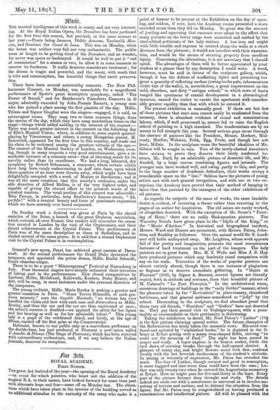Tin musical intelligence of this week is scanty and not
very interest- ing. At the Royal Italian Opera, the Trovatore has been perfomed for the first time this season, but precisely in the same manner as last year ;—Penco being Leonora, Didiee Azucena, Tamberlik Man, rico, and Graziani the Count de Luna. This was on Monday, when the house was neither very fall nor very enthusiastic. The public seem at length to be getting tired of the Trovatore, and no wonder, for never was opera so hackneyed. It would be well to put it "out of commission" for a season or two, to allow it in some measure to recover its freshness. It really deserves considerate treatment; for the drama is tragic and powerful, and the music, with much that is trite and commonplace, has beautiful things that merit preserva- tion.
There have been several noteworthy concerts. The New Phil- harmonic Concert, on Monday, was remarkable for a magnificent performance of Spohr's great descriptive symphony, called "The Power of Sound," and for Beethoven's Pianoforte Concerts in G major, admirably executed by John Francis Barnett, a young man who has gained a place among the first pianists of the day. Mdlle. Titiens and Signor Giuglini were the singers—engaged, it is said, on extravagant terms. They sang two or three common things, from the operas of the day, which they have sung numberless times on the stage—things which added nothing to the interest of the concert.— There was much greater interest in the concert on the following day of Ella's Musical Union; where, in addition to some superb quartet- playing by Vieuxtemps and others, a young Hungarian pianist, M. Boscovich, appeared for the first time in this country, and made out his claim to be reckoned among the greatest virtuosi of the age.— The concert of the Musical Society of London, on Wednesday even- ing, though in many respects a very good entertainment, gave a re- markable instance of a common error—that of choosing music for its novelty rather than its excellence. We had a long, laboured, dry symphony by Robert Schumann, a composer, whom certain critics have long been vainly endeavouring to puff into fame, upon which three-quarters of an hour were thrown away, which might have been delightfully occupied with a work of Mozart or Beethoven; and it was all the more vexatious that this society's orchestra, under the able direction of Alfred Mellon, is of the very highest order, and capable of giving the utmost effect to the greatest music of the greatest masters. The vocal portion of this concert was admirable : Miss Parepa, in particular, sang Beethoven's famous scene, " Ah, perfido !" with a musical beauty and force of passionate expression which we have scarcely ever heard surpassed.






























 Previous page
Previous page